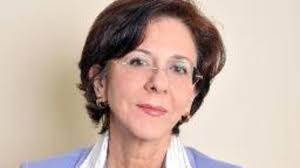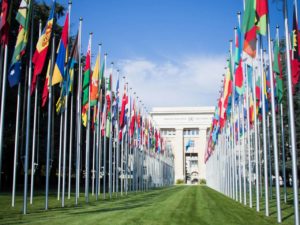
Beirut, 19 Jumadil Akhir 1438/18 March 2017 (MINA) – The top official of a United Nations commission that published a report describing Israel’s treatment of Palestinians as apartheid quit on Friday, saying the organization’s leader insisted that she withdraw it.
The report provoked outrage from Israel and the United States, nytimes.com reported.
The official, Rima Khalaf, a Jordanian diplomat who is executive secretary of the Economic and Social Commission for Western Asia (ESCWA), defended the report. Her resignation, barely two days after publication, punctuated the polarized politics of the Israeli-Palestinian impasse.
Also Read: Israeli Strikes Kill 63 Palestinians, Including 24 Children, in Gaza
Ms. Khalaf’s resignation also reflected the pressure from the Trump administration on her boss, Secretary General António Guterres. President Trump’s ambassador to the United Nations, Nikki R. Haley, has assailed what she and Israeli officials regard as a strong anti-Israel bias at the organization.
“When someone issues a false and defamatory report in the name of the U.N., it is appropriate that the person resign,” Ms. Haley said in response to Ms. Khalaf’s resignation. She praised Mr. Guterres for his “decision to distance his good office from it.”
The report appeared to represent the first time that apartheid — an explosive reference to the institutional oppression of South Africa’s black majority by the white minority, now banned under international law — had been used in a document with the United Nations stamp to explicitly describe Israeli policies toward Palestinians in lands occupied or controlled by Israel.
Mr. Guterres has said that he had no advance knowledge of the report and that it did not reflect his views.
Also Read: Hamas Denies Role in Rafah Attack, Accuses Israel of Violating Gaza Ceasefire
Israel and its supporters had exhorted Mr. Guterres to renounce the report, which they described as a baseless smear meant to isolate and delegitimize the country.
Ms. Khalaf had been made a scapegoat.
Supporters of the report have expressed hope that it could add momentum to an international movement to boycott Israel, which they see as similar to the global campaign of economic pressure on South Africa that helped end apartheid in the early 1990s.
Also Read: Nine Killed in Israeli Strikes on Gaza, Violating Ceasefire Agreement
The regional commission that produced the report, based in Beirut, Lebanon, comprises 18 Arab member states of the United Nations. Most do not recognize Israel. The authors included a former United Nations human rights investigator, Richard Falk, which particularly galled many Israel supporters who regard him as an anti-Semite and a discredited conspiracy theorist.
Many have questioned why the United Nations continues to engage with Mr. Falk.
Mr. Falk said in an email Friday evening that he had been “astonished by the furor caused by the report,” and that Ms. Khalaf had been made a scapegoat.
“It is an academic study that tries its best to look at the evidence and analyze the applicable law in a professional manner,” he said. “I feel that I have been smeared in this effort to discredit the report without reading it or criticizing its substance.”
Also Read: Netanyahu Orders Immediate, Powerful Strikes in Gaza Despite Ceasefire
Ms. Khalaf said at a hastily called news conference in Beirut that Mr. Guterres had pressed her to withdraw the report, which asserts that “Israel has established an apartheid regime that dominates the Palestinian people as a whole.”
Because of that pressure, she said, “I submitted to him my resignation from the United Nations.”
Ms. Khalaf also said she stood by the report’s conclusions. But as of Friday afternoon, the report could no longer be viewed on the commission’s website.
A spokesman for Mr. Guterres, Stéphane Dujarric, disputed Ms. Khalaf’s version of events.
Also Read: Extremist Settlers Storm Al-Aqsa Mosque Under Heavy Police Protection
The secretary general asked Ms. Khalaf to take the report down from the commission’s website, “not because of what it said but because no one at headquarters had been consulted prior to its release,” Mr. Dujarric said at a daily news briefing at the United Nations headquarters in New York.
The spokesman said that Mr. Guterres had not asked Ms. Khalaf to resign, and that her term had been set to expire at the end of the month.
Atmosphere of bullying and blackmail by some member states
Also Read: Foreign Airlines Continue to Suspend Flights to Israel Despite Ceasefire
The Palestinian ambassador at the United Nations, Riyad Mansour, who had commended the report, described Ms. Khalef’s resignation as regrettable and expressed admiration for “her principled position in defending principles that are enshrined in the U.N. charter and in international law.”
Without identifying Israel or its allies by name, Mr. Mansour also said, “we reject the atmosphere of bullying and blackmail by some member states, particularly those that violate international law and U.N. resolutions every day.”
The Palestinian chapter of Boycott, Divestment and Sanctions, the international campaign known as B.D.S., also commended Ms. Khalaf, asserting that she had “preferred to resign in dignity than to surrender her principles to U.S.-Israeli bullying.”
Many Palestinians have become increasingly despondent about the outlook for an independent Palestinian state, an aspiration that was further dimmed after President Trump took office and appointed aides who clearly favor Israel’s position in the conflict.
Also Read: Over 250,000 Tons of Waste Pile Up in Gaza City Amid Health Crisis
The Israeli ambassador to the United Nations, Danny Danon, who was among the first to castigate the commission’s report and call on Mr. Guterres to repudiate it, welcomed Ms. Khalaf’s resignation.
“Anti-Israel activists do not belong in the U.N.,” he said in a statement. “It is time to put an end to the practice in which U.N. officials use their position to advance their anti-Israel agenda.” (T/RS5/RS1)
Mi’raj Islamic News Agency (MINA)
Also Read: Israeli Forces Detain 40 Palestinians, Including Hamas Leader, in West Bank Raids




































 Mina Indonesia
Mina Indonesia Mina Arabic
Mina Arabic